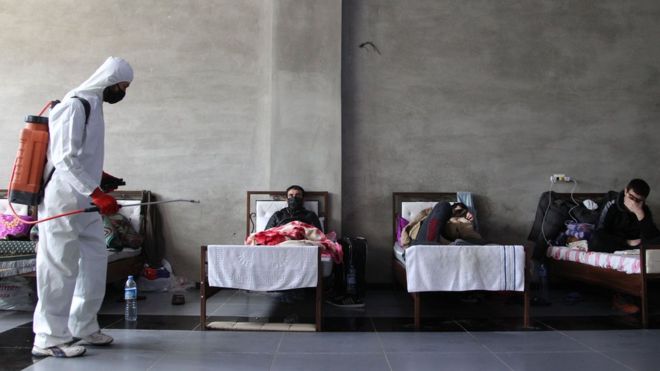A record 50.8 million people worldwide are internally displaced due to conflict or disaster, with coronavirus posing a new threat, a report warns.
In its annual report, the Internal Displacement Monitoring Centre (IDMC) says Covid-19 may add further risks to millions of already vulnerable people.
Over 45 million have been forced to abandon their homes due to violence.
A further five million have been displaced by natural disasters such as earthquakes and floods, the IDMC says.
It adds that the number of people internally displaced - those who flee conflict or disaster but remain in their own countries - has now reached a record high.
Contributing to the figures, it says, are 33.4 million new displacements recorded in 2019, the highest annual figure since 2012.
The new coronavirus is likely to make the lives of many of these people - some already living in cramped, unsanitary conditions such as makeshift emergency shelters, informal settlements and urban slums - more difficult.
Such overcrowded conditions make it hard to implement the physical distancing and hygiene measures required to prevent the spread of the deadly Covid-19 virus.
The pandemic also compromises their "precarious living conditions by further limiting their access to essential services and humanitarian aid," the director of the IDMC, Alexandra Bilak, said.
But even without the pandemic, the number of internally displaced people across the globe is a sign, the new report says, of collective failure.
The IDMC calls on governments to work towards solving conflicts like the civil war in Syria, where about a million people have fled their homes since December to escape a government offensive in a conflict that began nine years ago.
It also highlights conflicts in the Democratic Republic of Congo, Yemen, and Afghanistan.
The report suggests that more could be done to tackle climate change and to prepare for natural disasters, with millions of people displaced last year by cyclones and floods.
It calls on governments to ensure that those who have become displaced be given access to healthcare during the pandemic, and in the longer term, to address the causes of displacement.
The body said it was closely monitoring the situation in Iraq, where the first coronavirus cases among displaced persons had been confirmed, and in countries including Syria, Burkina Faso and Colombia, which are already dealing with displacement crises and where infection rates are rising.
The IDMC report also notes incidents of internal displacement attributed to the virus. In India, the report says, at least 600,000 migrant workers faced with nationwide lockdown "had to walk hundreds of miles to return to their villages".
Internally displaced people often decide not to travel very far, either because they want to stay close to their homes and family, or because they lack the funds to cross borders.
Many end up stuck in areas that are difficult for aid agencies to reach - such as conflict zones - and continue to rely on their own governments to keep them safe.
Those governments are sometimes the reason people have fled, or - because of war - have become incapable of providing their own citizens with a safe place to stay.
Latest Stories
-
Queenmother calls on President-elect Mahama to appoint more women in his government
50 minutes -
Atletico Madrid beat Barcelona to go top of La Liga
1 hour -
Usyk breaks Fury’s heart with points win in rematch
1 hour -
Ghana-Russia Centre to run Russian language courses in Ghana
7 hours -
The Hidden Costs of Hunger: How food insecurity undermines mental and physical health in the U.S.
7 hours -
18plus4NDC marks 3rd anniversary with victory celebration in Accra
10 hours -
CREMA workshop highlights collaborative efforts to sustain Akata Lagoon
10 hours -
2024/25 Ghana League: Heart of Lions remain top with win over Basake Holy Stars
11 hours -
Black Queens: Nora Hauptle shares cryptic WAFCON preparation message amid future uncertainty
11 hours -
Re-declaration of parliamentary results affront to our democracy – Joyce Bawah
12 hours -
GPL 2024/25: Vision FC score late to deny Young Apostles third home win
12 hours -
Enhancing community initiatives for coastal resilience: Insights from Keta Lagoon Complex Ramsar Site Workshop
12 hours -
Family Health University College earns a Presidential Charter
12 hours -
GPL 2024/25: Bibiani GoldStars beat Nsoatreman to keep title race alive
12 hours -
GPL 2024/25 Bechem United keep title hopes alive with narrow win over FC Samartex
12 hours

